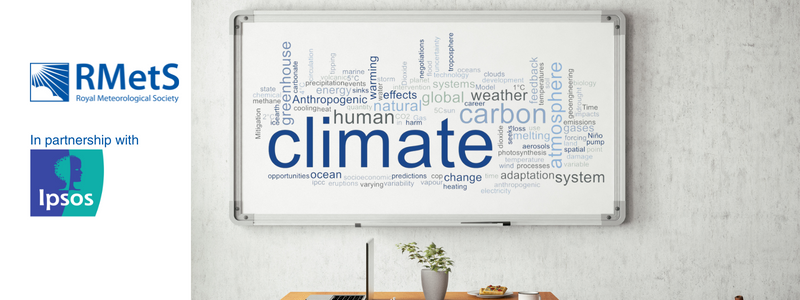

Despite around half of school leavers (54%) saying they have had education on climate change in the past year, confusion and misunderstanding prevail
- Very few accurately know how much the Earth has warmed since the start of the industrial revolution - the average answer given was 2.5°C versus the reality of 1.1°C.
- There is also misunderstanding around the sector which contributes most to global warming, with almost a quarter of school leavers selecting transport, when in fact industry, electricity and heat production comes first.
- Almost two-thirds are concerned about climate change, and there is an awareness for many (59%) that climate change will affect them personally.
New research from The Royal Meteorological Society in partnership with Ipsos shows an opportunity for better climate education in schools in Great Britain. Just over half of pupils in their final academic year (aged 15 to 16 years old) can recall being taught about climate change in the past year, with one in five (20%) believing that they either have never been taught about it or cannot recall when they were taught about it. This comes as student campaigners are putting pressure on the government to include compulsory teaching about climate change and its impacts.
When asked how much the climate of the Earth had warmed since 1850, school leavers tended to overestimate, saying, on average, +2.5°C. According to the IPCC, the true value is closer to +1.1°C. However, 40% of those asked said that they did not know how much the climate had warmed and could not give an answer.
Pupils were also unsure which sources had contributed the most to global warming, with only 18% correctly identifying that industry, electricity and heat production had the biggest impact. Positively, almost half (48%) correctly identified that natural changes (such as volcanoes and variations in the Sun and Earth’s orbit) contributed the least to global warming.
Climate concern
Despite mixed knowledge about climate change and its causes, 6 in 10 (62%) school leavers said they were very or fairly concerned about climate change. This rises to 74% amongst students who reported that they felt they were doing well at school. Furthermore, 59% of pupils think that climate change will impact them personally a great deal or quite a bit in their lifetime, with one in five (19%) saying it would impact them a great deal. Only 8% of students said that climate change would not affect them at all.
Dr Sylvia Knight, Head of Education at The Royal Meteorological Society, said:
“These results give us a really useful baseline against which we can measure the impact of future interventions on the climate literacy of our school leavers. At the Royal Meteorological Society, we are working very hard to see how we can best support teachers of all subjects to make use of the opportunities within the current curricula and exam specifications to teach climate change. All students should leave school with the basic climate literacy that will enable them to engage with the messages put forward by the media or politicians, or make informed decisions about their own opportunities and responsibilities and equip them with the skills that they’ll need for the green careers of the future.”
Dr Pippa Bailey, Head of Ipsos Climate Change & Sustainability Practice, added:
“This research tells us that despite more than half of school leavers saying that they have been taught about climate change in school in the past year that there are notable gaps in understanding around key messages regarding global temperature increase and the relative impact of different sectors contributing to climate change. However, this upcoming generation are clearly concerned and acknowledge that it will impact them personally, and there are signals that they need (and evidence in the media that they want) to be better informed to help shape the changes that will need to be made now and in the future”
Notes
- These are the findings of the Young Person’s Omnibus survey conducted between 14 March and 1 July 2022 and from a sample of 271 pupils aged 15-16 in their final academic year across England, Scotland and Wales. Data has been weighted by sex. The weights were derived from data from the Department for Education, StatsWales and the Scottish Government. More information can be found in the full report.
- The questions asked in the survey were developed by the Royal Meteorological Society, in conjunction with many of their members, including the Intergovernmental Panel on Climate Change report authors, to make sure that they give a fair assessment of climate literacy and will remain relevant in years to come as we hope to repeat the survey on an annual basis.
- A recording from the launch event 'Panel Event: Climate Literacy in 2022 School Leavers' will be available on YouTube
Donate
We have ambitious plans for every UK student to leave school with a basic understanding of climate change. Your generosity can help us leverage changes and develop essential resources. Please make a donation and help make a difference today. Thank you.

